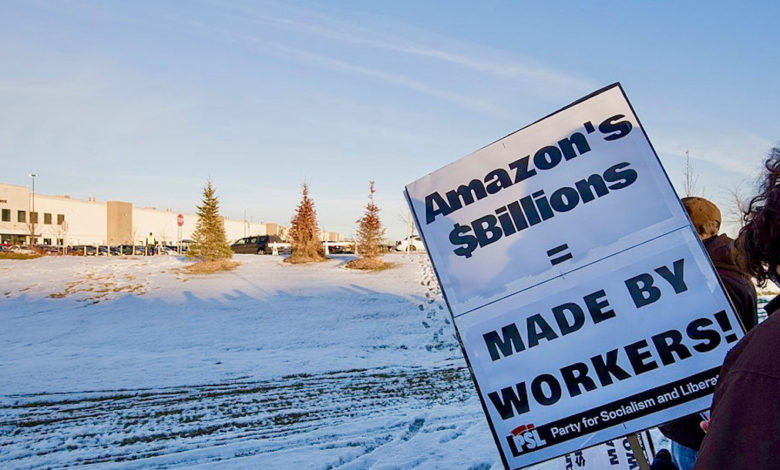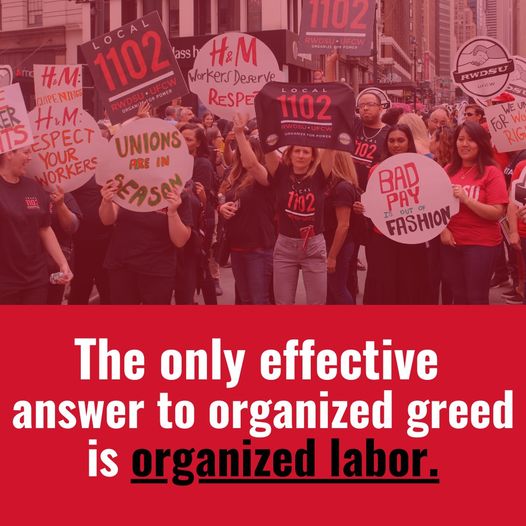
In a historic development, 5,800 workers at an Amazon warehouse in Bessemer, Alabama, are right now voting on whether to be represented by the Retail Wholesale and Department Store Union. If the workers vote ‘yes,’ it will be the first time that an Amazon facility in the U.S. is unionized.
Amazon, the world’s largest on-line retailer, recorded $386 billion in annual revenue in 2020, with net profits up 84 percent from the year before. Who makes these profits possible? Not Jeff Bezos, the company’s founder and CEO. He doesn’t have to do a thing to fatten his net personal worth of $190 billion. It’s those who toil for Amazon in the warehouses and fulfillment centers, on the delivery routes, in the offices, that bring in the profits for Bezos and the Board of Directors.
This mega company can surely afford better salaries and benefits for these workers. Instead, Amazon is spending millions on a high-pressure anti-union campaign, assisted by pricey union-busting law firm Jackson Lewis.
Filthy rich, Amazon has even used its clout to get local authorities in Bessemer to shorten the time of stoplights outside the plant so that union organizers can’t hand out pro-union literature to workers passing in their cars!
Amazon has forced workers to attend anti-union meetings, sends workers many anti-union text messages daily, and even posted leaflets in bathroom stalls in a massive campaign of lies and intimidation to get workers to reject the union.
Here are some of Amazon’s lies about what unions are and what they do, and the truth.
Lie 1: Amazon already takes care of its workers. Amazon says “Why have a union, and pay union dues, when you already have what you need for free?”
Truth: What? Workers at Bessemer, and at every Amazon warehouse and fulfillment center, complain of long work days, heavy lifting, speedup and aggressive tracking of workers so that there isn’t even enough time for lunch or for bathroom breaks in a 10-hour day. Taking time to walk down long halls to the bathroom can be held against them, and can even lead to termination. Work conditions are unsafe. At Bessemer, workers have fainted due to lack of air conditioning in the hot Alabama summer. Nineteen workers have died at Amazon facilities since 2013. Outrageous quotas have left many with illnesses and lifetime injuries. Conditions are unsanitary and COVID-19 rates have been high due to lack of personal protective equipment. Workers can be fired for any reason.
Overtime is mandatory, and workers are told just hours before a mandatory overtime shift begins. Amazon calls itself “generous” for a starting pay of $15.30 an hour, but unionized warehouses in the area pay $19 to $20 an hour for the same work. And Amazon stopped its $2-an-hour pandemic bonus.
Lie 2: The union is an outside third party.
Truth: Unions are not “outsiders.” They are made up of the workers at their job, coming together so they have more clout to better their lives. A union is the employees’ own organization. It is created and shaped by these workers.
Far from exploiting workers, unions are responsible for lessening their exploitation by the boss. Unions have won working people the 40-hour work week, defining work over 40 hours as “overtime” with higher pay, paid holidays, vacations, sick days, family and medical leave, pensions, safety standards and more. During the pandemic, unions have secured PPE and negotiated safer working conditions.
Lie 3: Unions are profit-seeking businesses that exploit workers. Amazon calls a union “a business that makes money from dues collected from workers’ paychecks each month.”
Truth: The idea of unions being a for-profit businesses isn’t only false in practice, the legal definition of a union bars it from making profits. Under the law, unions are 501(c)5 non-profit organizations. Amazon is the for-profit business making billions by exploiting the workers.
Lie 4: Unions just want your dues. The first thing that happens when you join the union, says Amazon, is “they take almost $500 in dues, with no guarantees of any improvements!”
Truth: Monthly union dues (certainly not $500!) are not paid immediately. Union members pay dues only if the union successfully wins a contract, a contract that almost certainly would contain higher wages and better working conditions. In Alabama, even if the union is voted in, workers may decide not to join the union or pay any union dues at all. They would still benefit from a union-negotiated contract.
Dues fund union operations. Dues money is used for organizing, safety and health education, to produce informational newsletters on worker rights, for collective bargaining and grievance/arbitration representation, and to train union members and employees to better protect worker rights.
Lie 5: Unions have no clout and may make matters worse for workers. The company says: “Only Amazon can make commitments about hours, wages and benefits. With collective bargaining you may end up with more, the same, or less.”
Truth: Without a union, it’s just you and the company. By bringing workers together, unions have the strength to improve wages and conditions dramatically. Unions negotiate binding contracts with employers that spell out wages, benefits and working conditions, and hold the bosses to these agreements.
This is why, on the average, union workers earn 27 percent more than nonunion workers. Union women earn 34 percent more than nonunion women, African American union members earn 29 percent more than nonunion, Latino workers 59 percent more and Asian workers 11 percent more than their nonunion counterparts.
Union workers are 54 percent more likely to have employer-provided pensions. More than 83 percent of union workers have jobs that provide health insurance benefits, while 62 percent of nonunion workers do.
Lie 6: If you vote in a union, you lose your voice. If “you have a problem, the union will decide whether to bring the issues to management,” says Amazon.
Truth: With a union you gain a voice. With or without a union, workers can always go to management by themselves with a problem. If a unionized worker feels they have been treated unfairly, they usually go to the union. Unionized workers have won a legal, contractual way to address mistreatment. A union provides workers with representation when dealing with the boss. Unions know the contract, labor laws, and what the boss can and cannot do.
Lie 7: Unions force you to go on strike, and you will not be paid by Amazon or be eligible for unemployment benefits.
Truth: Only the workers themselves can call a strike. Most union contracts require a super majority to go on strike. This means that nearly 4,000 of the 5,800 Amazon workers in Bessemer would have to vote to go on strike. Strikes can be useful when needed, but they are rare. Less than 2 percent of bargaining units go on strike. Unions have many effective and sophisticated ways of exerting pressure over issues of concern to the workers.






